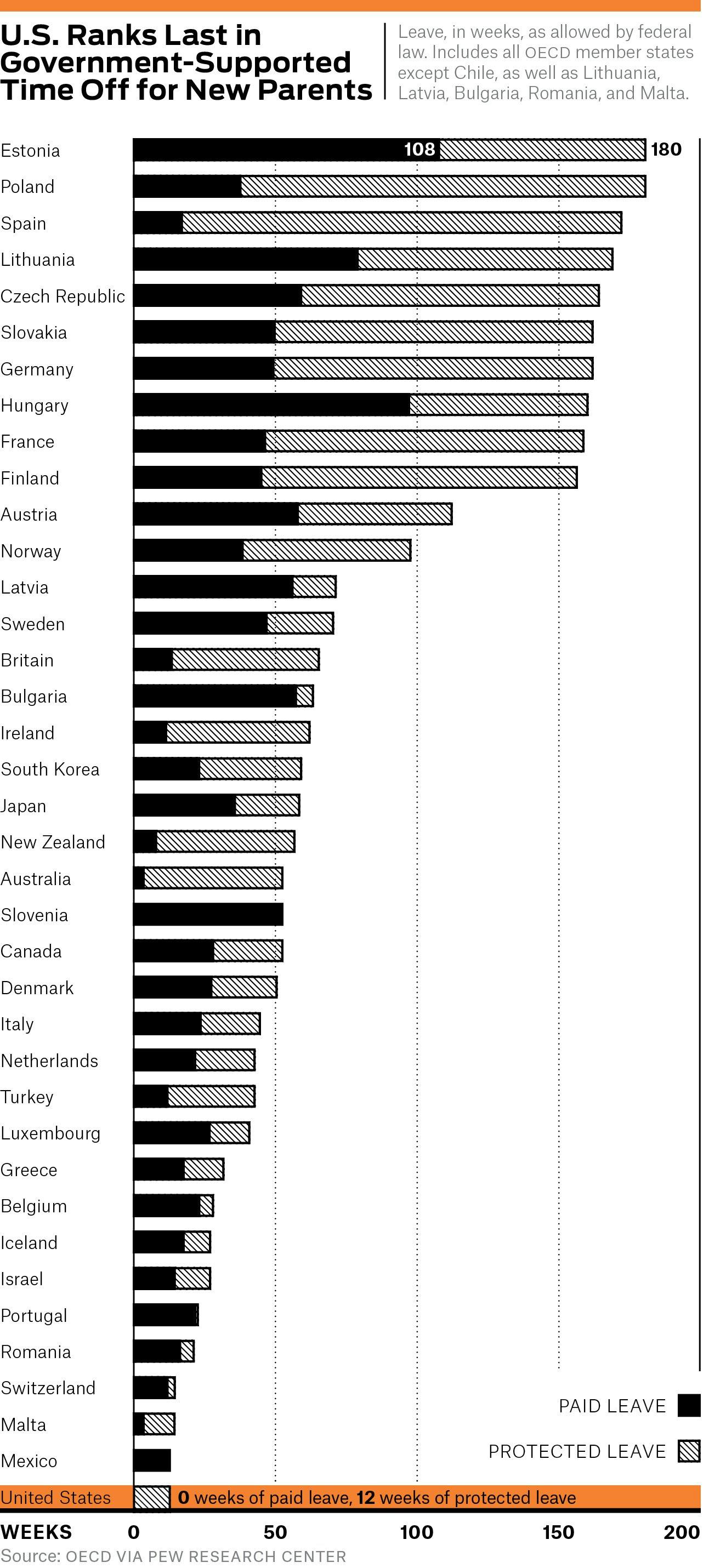Lots of people are talking about work-family issues these days. And that’s a good thing, particularly when it comes to paid family leave. Every other country in the developed world makes sure that workers can take time off, with pay, to take care of a newborn or sick relative. (See chart below.) As my colleague Rebecca Traister points out, the lack of a similar guarantee here is a disgrace—and proof that we still carry around some retrograde ideas about the proper role of women in society.
The idea makes economic sense. There’s no reason to think guaranteeing paid leave will hurt the economy—and some very good reasons to think it might help. California is one of three states that have such a program and, by all accounts, it’s working well. But it’s going to take more than economic research and online journalism to make paid leave a reality in this country. It needs a champion in the political world—ideally, one running for president who would be willing to make it a central campaign promise.
Yes, Hillary Clinton. That means you.
Clinton's record on work-family issues in general goes back a long time, at least to the 1970s when, fresh out of law school, she started working with the Children's Defense Fund. The issues came up during her husband's presidency, too, most visibly during a 1997 White House conference on child care over which both Clintons presided. But progress on the issue has been slow. Distressingly little has been done since Bill Clinton's first day in office, when he signed the law (the Family and Medical Leave Act) that for the first time guaranteed Ameirican workers in medium- and large companies up to 12 weeks of (unpaid) leave.
Should she take the next step, and make this a centerpiece of her campaign if she runs for president? Journalist Michael Tomasky thinks so. And in his latest column for the Daily Beast, he makes a strong case.
Such a proposal wouldn't just make sense as policy, he argues. It would also make for good politics, even given the opposition it's likely to provoke. "A survey commissioned in 2012 by a pro-leave group found that respondents supported the idea by 63 to 29 percent," Tomasky notes. "Democrats were of course strongly in favor (85-10), but independents were at a still quite favorable 54-34, and even Republicans weren’t against it—they were evenly split at 47-48."
Of course, polling on an issue that hasn’t gotten much attention isn’t always reliable. Public sentiments could change if the Chamber of Commerce, which would spend heavily to fight such a plan, convinced Americans it would hurt the economy. And I plea totally guilty to political bias on this. I think paid leave is a great idea—an innovation that’s long overdue.
But campaigns aren’t just about proposing what works politically. They’re also about laying the groundwork for a governing agenda. And while lots of people are skeptical that Clinton would take such a risk, if indeed she's the nominee, I’m not. One reason is that she proposed such an initiative in 2007, the last time she ran for president.
It was a smaller initiative than what people like Tomasky and I have in mind. A more comprehensive proposal would look more like the scheme that Heather Boushey and Alexandra Mitukiewicz laid out in a paper for the Center for American Progress. That paper is the basis for the so-called FAMILY Act, put forward Kirsten Gillibrand in the Senate and Rosa DeLauro in the House. Such a proposal would cost more than the $1 billion in annual spending that Clinton's 2007 proposal would have. That's one reason it would probably provoke much more strenuous opposition, pitting Clinton (or any Democratic presidential nominee) against business groups and, quite possibly, the Republican nominee.
The prospect of such opposition may explain why, during a recent interview, Clinton didn't jump at a chance to endorse the idea. Instead, she reiterated her support for the principle while noting it would be difficult to get through Congress. Clinton was right about that, of course. It would probably take a fight. But some fights are worth having. This is one of them.

